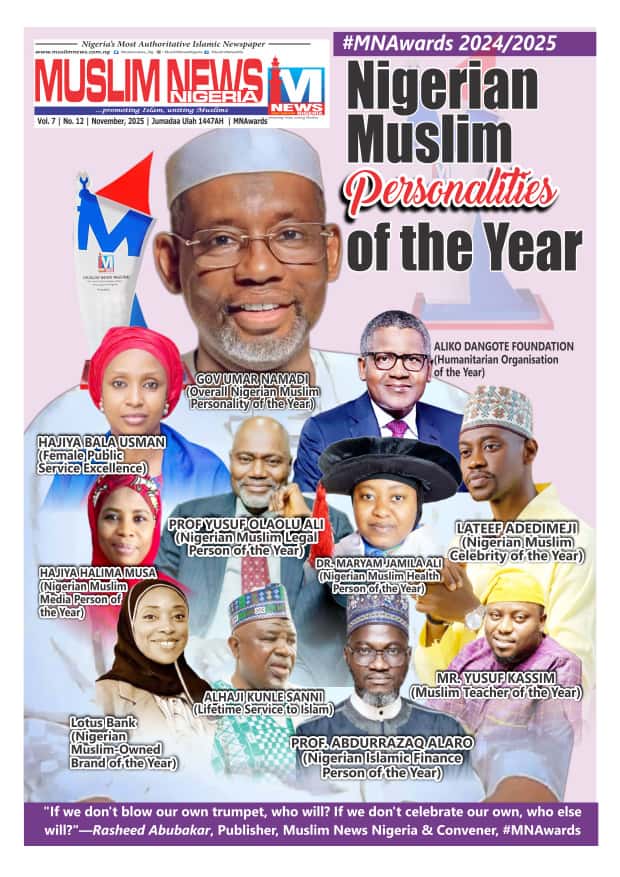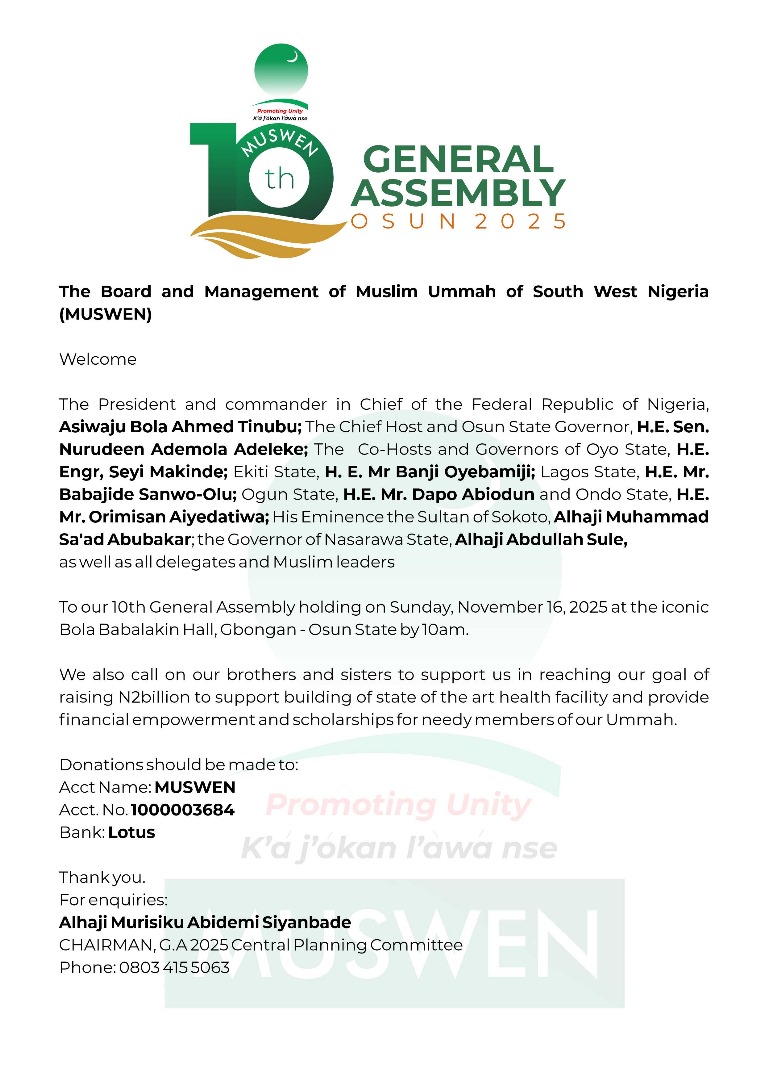By Dr. Lukman Raimi
Background
On August 24, 2025, Premium Times published an article titled “Analysis: Nigeria Should Remain Neutral and Engage with Israel,” which argued that Nigeria at the moment ought to adopt a prudent and pragmatic foreign policy stance in the Israel–Palestine conflict by remaining neutral while engaging with Israel. In a plural democracy, everyone is entitled to his or her opinion, but the article advances skewed pro-Israeli positions. Guided by Martin Luther King Jr.’s warning in Strength to Love (1963) that “the ultimate tragedy is not the oppression and cruelty by the bad people but the silence over that by the good people,” I am compelled to write this rebuttal because the author frames neutrality as a guarantee of diplomatic flexibility, economic interests and security cooperation for Nigeria.
The article acknowledges Nigeria’s long-standing support for the Palestinian cause, but ultimately it sidelines the Palestinian issue and subtly gives Israel a privileged place in the balance of power. In attempting to counter the bias in the analysis, this rebuttal uses the lens of power asymmetries in international relations. It highlights how the initial analysis placed Israel as the dominant actor, with overwhelming military, economic, and diplomatic leverage, while underplaying the reality of Palestine as a weaker and structurally disadvantaged party. This framing risks portraying neutrality as insularity and consequently obscures Nigeria’s historic and moral role as a principled defender of justice in world politics. For the avoidance of doubt, Nigerian foreign policy has consistently opposed oppression and repression of the weak: it recognises Palestine, supports a two-state solution to the Israel-Palestine conflict, condemns Israeli occupation, and calls for humanitarian aid for the hopeless, helpless and hapless Palestinians. Historically, Nigeria has also been at the forefront of the global anti-apartheid struggle, leading the fight for justice, liberation, sanctions, and solidarity throughout Africa and beyond.
For clarity, this rebuttal emphasises that Nigeria’s foreign policy needs to: (1) address the power imbalance and asymmetry of conflict; (2) strike a balance between strategic neutrality and moral clarity; (3) avoid risks of perceived bias and Indifference; (4) dismiss overhyped economic benefits; (5) maintain credibility; (6) denounce/condemn injustice, (7) reaffirm solidarity, and exercise principled non-aligned leadership.
First Rebuttal: Power Imbalances and Asymmetry of Conflict
The article published in Premium Times, in prescribing neutrality, implicitly acknowledges Israel’s superior leverage—militarily, diplomatically, and technologically—but fails to account for the consequences of such power asymmetry. In international relations, neglecting structural disparities between parties runs the risk of normalising dominance, particularly when the more powerful party (Israel) is defending an unfair cause. On November 18, 1988, Nigeria formally recognised the State of Palestine, and it has continuously supported Palestinian rights at the UN. For instance, it supported Palestine’s admission to UNESCO and non-member observer status at the UN. Given that Palestine is the weaker party in an unfair conflict due to occupation, humanitarian crises, and political instability, Nigeria’s admirable position is based on this reality. Nigeria has long served as a voice for equity in international affairs, and downplaying this disparity threatens that prestigious position.
Second Rebuttal: Strategic Neutrality vs. Moral Clarity
The article claims that since independence, Abuja anchored its foreign policy on non-alignment and African priority, building credibility across Western and Eastern, Arab and Israeli divides, while leading peacekeeping and mediation. This narrative is half-truth! Nigerian foreign policy, though pragmatic, has always carried a moral weight balanced with strategic neutrality and moral clarity. It recognised the state of Palestine unconditionally and has consistently supported Palestinian resolutions in the UN. Nigeria remains a strong supporter of a two-state solution. In October 2023, President Bola Tinubu repeated this position at the Riyadh Summit, calling for a humanitarian ceasefire between Israel and Hamas and reaffirming the two-state solution as the best way to resolve the Israel-Palestine conflict. These proactive steps show that Nigeria’s neutrality has never meant indifference or apathy; rather, it reflects a careful diplomatic balance. True balance requires cautious engagement with Israel, but also a principled defense of Palestinian rights. Encouraging Nigeria through the write-up to become a pro-Israel ally for economic and military benefits is a distortion of history that undermines the credibility of the world’s champion of justice.
Third Rebuttal: Risks of Perceived Bias and Indifference
The article demonstrates a perceived bias and indifference by deliberately minimising and underplaying the Palestinian struggle. Describing the conflict as the Israel–Hamas war narrows its scope, framing it as a fight against a militant group rather than a decades-long occupation of Palestinian land. Have you forgotten so soon the Nakba (mass expropriation and expulsion of Palestinians during the creation of the State of Israel) of 1948? This rhetorical shift erases the realities of millions of Palestinians living under blockade, displacement, oppression and systematic genocide, while portraying Israel’s criminal actions as counter-terrorism rather than part of an ongoing occupation. The article is therefore framed to reduce a broader national fight for self-determination into a clash with a faction, thereby legitimising Israel’s narrative and undermining Nigeria’s principled stance of supporting oppressed peoples and opposing apartheid-like systems. Consequently, such a posture being recommended risks depicting Nigeria as indifferent to human suffering, which would not only harm Nigeria’s credibility in the Global South but also cause dissonance at home, where many people see Palestine’s cause as a matter of justice and self-determination. On Sunday, August 24, 2025, at the opening of the annual general conference of the Nigerian Bar Association (NBA) in Enugu, South African EFF leader Julius Malema praised Nigeria’s key role in the fight against apartheid in Africa and beyond. He hailed Nigeria as a giant of justice, and recalled powerful gestures like the South African Relief Fund, the Mandela tax, and Nigeria’s boycott of major international events like the 1976 Olympics to protest apartheid. True neutrality, therefore, does not mean remaining silent about humanitarian crises, particularly in situations where power imbalances are stark.
Fourth Rebuttal: Overhyped Economic Benefits
The article dangles the promise of Israeli economic benefits like carrots before Nigeria, exaggerating their importance while downplaying viable alternatives. While Israel may have overhyped expertise in some aspects of water technology, agritech, and cybersecurity, it is not irreplaceable and indispensable. Countries such as Taiwan, South Korea, Japan, Turkey, China, and several Western nations with better human rights records offer broader, more sustainable, and often more affordable technological and economic partnerships. Many of these forward-looking countries already have deeper footprints in Nigeria’s economy, with proven records in industrialisation, manufacturing, infrastructure, and human capital development. By contrast, Israel’s economic relevance to Nigeria is modest at best and often overstated by its admirers within the country. Overreliance on Israel risks turning engagement into dependency, partnership, and complicity with a state increasingly isolated in Europe, even by its traditional allies. Precision technologies and solutions such as climate-smart agriculture, technology transfer, and innovation can be achieved through partnerships with larger economies and stronger global networks, without the attendant political and diplomatic risks. Nigeria’s economic future rests on diversification, transformational leadership, and strategic alliances with responsible nations, not on elevating a minor player with exaggerated prominence and a questionable political image within the comity of nations.
A Balanced Alternative
Building on the four rebuttals outlined above, this paper advances A Balanced Alternative framed through three-point recommendations carefully designed to guide Nigeria’s foreign policy with principle, pragmatism, and moral clarity.
1. Clear Condemnation and Moral Support: Nigeria should not only remain engaged diplomatically but should also take a principled stand by openly condemning Israel for its excessive use of force, genocidal tactics, and violations of human rights. In line with its historic recognition of Palestinian statehood, Nigeria must join other forward-thinking countries in calling for the two-state solution to be urgently implemented. Beyond rhetoric, Nigeria should extend moral, political, and financial support to Palestine, strengthening its identity as one of the leaders in the Global South standing for fairness and justice. Nigeria should also join South Africa and other countries in demanding that Israel be held accountable for violations of international law and humanitarian principles.
2. Reaffirmation of Historical Precedent with Stronger Action
Nigeria’s recognition of Palestine in 1988 and its consistent support at the United Nations have laid the solid foundation for continued solidarity. But reaffirmation must go beyond symbolic votes. At the forthcoming UN General Assembly, Nigeria should renew its commitment to work for Palestinian recognition, joining Australia, France, Canada, the United Kingdom, and Malta, even though its position remains unchanged from the 1988 decision. Nigeria should also actively sponsor or co-sponsor resolutions calling for ceasefires, humanitarian assistance, and accountability for violations of international law. This will demonstrate that neutrality is not tacit acquiescence, but the active pursuit of justice, fairness, and peace.
3. Moral Leadership Anchored in Non-Alignment
Neutrality should not mean isolation or complicity. As a respected voice in the Non-Aligned Movement and in the African Union, Nigeria can exercise moral leadership by rallying the nations to a single demand for justice in Palestine. This means pushing for humanitarian corridors, mobilising regional and international assistance, and stepping up calls for equitable negotiations. In this way, Nigeria retains its non-aligned status, while ensuring that structural imbalances are not likely to be legitimised for the benefit of a stronger player. During the anti-apartheid struggle against land dispossession across Africa, Nigeria, Tanzania, Zambia, and Ghana galvanised continental pressure that ultimately led to the abandonment of apartheid regimes. Nigeria can draw from this proud legacy of principled diplomatic activism to reaffirm the two-state solution as a pragmatic foreign policy stance in the Israel–Palestine conflict. Our priority should not be searching for economic opportunities in Israel but rather standing firmly on the side of justice, equity, and peace in global affairs.
Conclusion
The contentious article oversimplifies neutrality by prioritising engagement with Israel for economic and military benefits, while downplaying Palestine’s predicament. Thomas Jefferson (1743–1826), one of the Founding Fathers of the United States, the principal author of the Declaration of Independence (1776), and the third President of the United States (1801–1809), stated unequivocally: “We hold these truths to be self-evident: that all men are created equal; that they are endowed by their Creator with certain unalienable rights; that among these are life, liberty, and the pursuit of happiness.” Similarly, Desmond Tutu unapologetically affirmed: “If you are neutral in situations of injustice, you have chosen the side of the oppressor.” The moral necessity of opposing injustice rather than remaining passive is aptly captured in both iconic quotations. Based on the foregoing, a truly balanced Nigerian foreign policy should protect national interests without sacrificing the country’s historic role as a moral voice for the oppressed in the whole of Africa and beyond. Nigeria’s pragmatic and forward-thinking foreign policy earned us the title of “Giant of Africa.” We may face socio-economic challenges as a nation, but these should not drive us to compromise the truth, to side with the oppressors, or to forsake our responsibility as the guardians of our brothers. Nigeria’s moral authority in world affairs is strongest when it is grounded in justice, fairness, and principled diplomacy. By reaffirming its support for Palestine, by aligning with like-minded countries, and by standing firm in the cause of humanity, Nigeria can preserve its historic role as a voice for the downtrodden and a champion of peace.
* Dr. Lukman Raimi is a public intellectual, a writer, a legal scholar, a proponent of good governance and an educator of entrepreneurship. He writes from Brunei and can be reached at luq_man2001@yahoo.com.








Excellent rebuttal by Dr. Lukman Raimi. I hope its get to the appropriate Nigeria government authority. Thank you for the publicity .